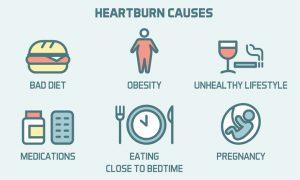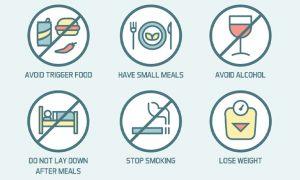PREVENT GERD BY EATING HEALTHY

This week is GERD Awareness week.
Gastro-Esophageal Reflux Disease (GERD)
It is a disorder that affects the lower part of the esophagus (food pipe) due to abnormal and frequent acid exposure from the stomach. If one neglects this condition, it could also lead to esophageal cancer.
Acid reflux can happen when you consume certain types of food such as spicy food, fried food, alcohol, smoking, coffee, and chocolates.
There are also some drugs that can cause GERD. Drugs that have been implicated include medications that are used for asthma, a few anti-hypertensives, painkillers, sedatives, and anti-depressants.
Acid reflux can lead to heartburn which is a painful burning sensation in the middle of your chest that is caused by acid reflux. Heartburn usually worsens after eating and lying down. It can be particularly uncomfortable when it occurs at night.
Besides heartburn, sour taste in the mouth, regurgitation, and extraesophageal symptoms like chronic cough, exacerbation of asthma, etc. Sensations of a lump in your throat, chest pains, and difficulty swallowing, are some more symptoms of GERD. Notably, GERD is a cause of non-cardiac chest pain and needs evaluation by a specialist before diagnosis. In addition, patients with GERD can suffer from chronic dry cough which needs to be kept in mind before evaluating the lung for primary pulmonary issues.
There are some people who are more prone to GERD.

- Pregnant women could suffer from GERD owing to increased intra-abdominal pressure
- Obesity can cause GERD. In fact, even surgical procedures performed for weight loss can lead to GERD.
- Frequent smoking/ binge alcohol intake or frequently eating large meals can increase the risk of GERD
- Few connective tissue disorders like systemic sclerosis can lead to GERD
You can prevent and treat GERD by making dietary and lifestyle changes.

○ Avoid spicy food, fried food, mass-produced fast food, caffeinated drinks (coffee, energy drinks), and alcohol.
○ Frequent small meals are ideal to prevent GERD. A light dinner that can be taken early to enable a time gap of at least 2-3 hours between dinner and sleep time could be beneficial.
○ Sleeping with one or two pillows under your head to raise your head while sleeping could be beneficial for nocturnal symptoms.
○ Weight loss strategies with dietary modifications could have profound effects on GERD
○ Daily exercise has been shown to have myriad health benefits.
-
Medications:
○ There are medications that can be used for GERD. Most of these medications reduce acid output and have profound effects on GERD symptoms. However, although they are safe, long-term use of these medications has been shown to have some side effects.
○ Antacids are widely used and can prove to be beneficial when there is severe heartburn for symptomatic relief. However, these cannot be taken long-term.
-
Endoscopic management:
○ Endoscopy can detect infections like H pylori that can increase acid output. Treatment of these infections can reduce acid output in the stomach and reduce GERD
○ More importantly, endoscopy can diagnose Barrett’s esophagus. Once diagnosed, the patient will require regular endoscopy to look for progression and enable early diagnosis of esophageal cancer.
-
Surgery:
○ Surgery is generally reserved for patients with severe symptoms not responding to medical therapy. Patients with hiatus hernia will also benefit from surgical options.
We, at Ramaiah Memorial Hospital, have an expert team of gastroenterologists to help you have a healthy gut and make timely changes in your lifestyle.
Professor & Senior Consultant
Medical Gastroenterology


